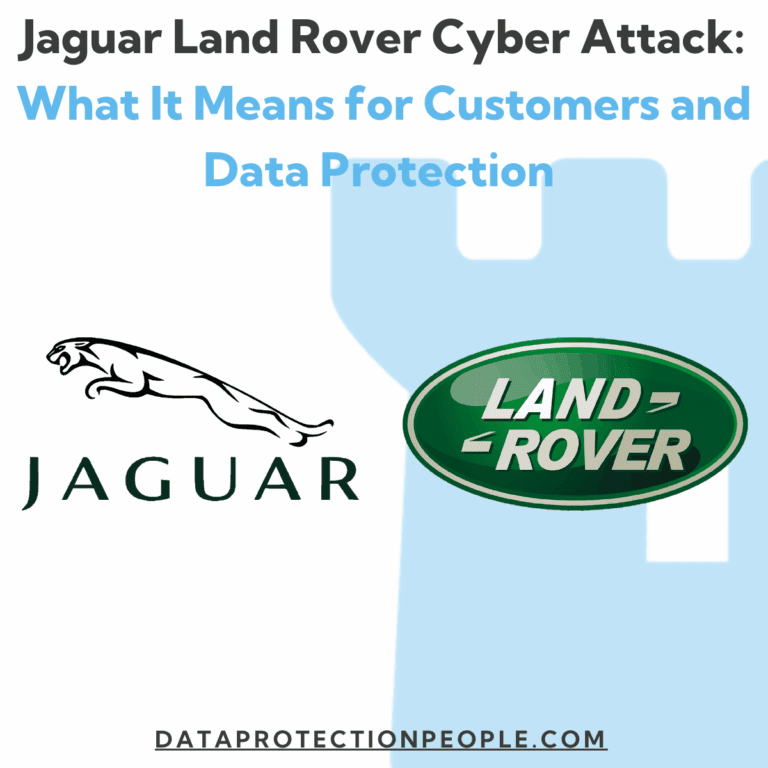Jaguar Land Rover Cyber Attack: What It Means for Customers and Data Protection
Jaguar Land Rover’s cyber attack caused global disruption and raised data protection concerns. Learn what it means for customers and businesses.

Jaguar Land Rover Cyber Attack: What It Means for Customers and Data Protection
Hackers linked to the recent Marks & Spencer (M&S) breach have claimed responsibility for the Jaguar Land Rover (JLR) cyber-attack that happened September 2025.
The company shut down IT systems across the globe. The attack disrupted vehicle production, dealerships, and administrative operations in the UK, Slovakia, Brazil, and India.
Hacker groups, including Scattered Spider, Lapsus$, and ShinyHunters, also published alleged internal data online.
While no confirmed data breach affecting customers has been reported, the incident highlights how quickly cyber threats can compromise operations, reputations, and potentially personal data, underscoring the importance of UK GDPR compliance and robust cyber resilience.
What Happened
On 2 September, Jaguar Land Rover switched off its digital systems to contain the attack. Production stopped across factories, while retail and dealership systems went offline. Staff in several countries stayed home as the company worked to restore systems. Industry sources estimate the company could have lost around £5 million per day. The timing coincided with the peak of UK car sales, creating further disruption.
Jaguar Land Rover informed the Information Commissioner’s Office (ICO) within 72 hours, following UK GDPR rules. This was the right step. So far, there is no evidence that customer data was stolen, but the risk remains.
Impact on Customers
For customers, the most obvious consequence has been operational disruption:
- Vehicle deliveries have been pushed back
- Repairs and diagnostics remain unavailable
- Dealerships have struggled to order parts and update service records
Alongside the operational delays comes uncertainty. Questions about whether personal data has been exposed create unease, even though no breach has yet been confirmed. People want clear communication and reassurance, and without it, confidence in the brand begins to weaken.
Jaguar Land Rover has long been associated with quality and dependability. A high-profile cyber attack risks undermining that reputation. Customers who expect a seamless, premium experience instead face delays, doubt, and disappointment.
Lessons for Data Protection
The Jaguar cyber attack highlights several important lessons: Incident Response and Containment
Organisations must have strong incident response plans. Shutting down systems limited the damage, but recovery has been slow. Plans should focus on both containment and quick restoration.
Communication and Transparency
Clear communication is vital. Jaguar Land Rover notified the ICO, but customers also need updates. Silence damages confidence more than admitting uncertainty.
Cyber resilience and risk management
Businesses must also understand financial risks. Few companies can withstand millions in daily losses. Cyber insurance, supplier contracts and resilience planning can reduce exposure.
GDPR requires appropriate technical and organisational measures to ensure data security (Article 32).
Every organisation needs a communication strategy for crises. Customers value honesty. Timely updates protect trust and reduce long-term reputational harm.
Culture of data protection
Staff training on phishing, social engineering, and safe handling of personal data is essential.
Data protection should be integrated into everyday operations, not treated as an afterthought.
Wider Business Impact
This attack shows no organisation is safe, regardless of size or resources.
Even premium, global brands can fall victim to cybercrime. Preparation, planning, and a strong data protection culture are the key defences.
For customers, the consequences extend beyond delayed services to potential risks to their personal data. Businesses that fail to plan and communicate risk eroding trust that can take years to rebuild.
Questions Every Business Should Ask
Could we keep operating if systems were offline tomorrow?
Yes, but only if you have a tested business continuity plan. Offline processes or manual workarounds should be in place to keep essential services running.
Would we know how to contact the ICO quickly?
Yes, every organisation should have the ICO’s details saved and know the reporting process. A data breach must be reported within 72 hours under UK GDPR.
Do we have tested backups ready for recovery?
Yes, if backups are secure, up-to-date, and regularly tested. Backups are only useful if you know they can be restored quickly and effectively.
How would we update customers if data was at risk?
By following a clear communication plan. Customers should receive honest, timely updates that explain what happened, what risks exist, and what action is being taken.
Asking these questions now saves time, money, and reputation later.
Final Thoughts
The Jaguar Land Rover cyber attack halted production, delayed sales, and created fear about customer data. While investigations continue, the message is clear. Cyber resilience and data protection are not optional extras.
Every business, large or small, must prepare for the unexpected. Incident response, strong communication, and tested recovery processes make the difference between disruption and disaster.
At Data Protection People we help organisations build resilience and protect customer trust. By simplifying compliance and strengthening defences, we make data protection practical and effective. The Jaguar incident shows why this matters more than ever.
